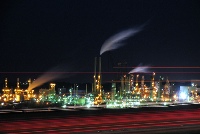IEA sees high refinery activity boosting fuel supply
By KONSTANTIN ROZHNOV and SARAH KENT
LONDON -- Strong refinery activity should boost supply of diesel and gasoline through year-end, bringing relief to hard-pressed consumers, the International Energy Agency said in a monthly report Wednesday.
But the IEA head of oil industry and markets didn't rule out a future release from the emergency stockpiles of its 28 member states.
The Paris-based energy watchdog, which represents major oil-consumer nations, expects refiners to process around 75.7 million bpd of crude in the third and fourth quarters, 1.3 million bpd more than in the last quarter of 2011.
“There is a rebalancing under way. If it continues, having more product on the market will relieve the very tight market situation we have and that will be very welcome,” said Antoine Halff, the IEA's editor and head of the oil industry and markets division.
 Behind the third-quarter output rise is unexpectedly high production in developed economies, driven by strong refinery profit margins.
Behind the third-quarter output rise is unexpectedly high production in developed economies, driven by strong refinery profit margins.
But as this high production isn't expected to last, the expected strong fourth-quarter growth is likely to be driven by demand and capacity increases in Asia, Africa and the Middle East.
Fast-expanding emerging economies continue to provide the biggest share of annual growth in refinery output, the IEA said.
The annual growth, the strongest since the beginning of 2011, isn't exceptional as it is coming from low levels, but it helps increase low inventories of fuels such as diesel and gasoline, said Toril Bosoni, a senior oil market analyst at the IEA.
However, the pressure on supply will be easier to assuage for some products than others, the IEA's Mr. Halff said, adding that supply of distillates like diesel would likely remain tight.
Low stocks of diesel, which is used as heating fuel, could provoke a spike in prices of the fuel ahead of the northern hemisphere's winter, analysts have warned.
Futures contracts of high-quality diesel used to fuel cars have already risen by 25% since the end of June due to rising oil prices and low inventories.
The energy agency said the oil market picture remained cloudy, due to conflicting pressure on supply and demand. Given this, Mr. Halff didn't rule out a release from member countries' emergency oil reserves.
“I don’t think we can make a determination at this stage,” Mr. Halff said. “It’s a very dynamic market and there are many moving parts; there's concern about the economy and there's concern about supply, I don't think there is any room for complacency.”
The IEA has in the last month faced calls for a release from emergency stocks, as historically high oil prices have increased concern over the impact of energy costs on struggling economies, particularly in an election year in the US.
Recent comments from the IEA's executive director, Maria van der Hoeven, emphasized that there is no disruption to supplies and played down the need for a stock release. In its Wednesday report, the IEA repeated that supply levels remained fairly comfortable.
Mr. Halff said the IEA was closely monitoring the market and keeping in touch with all concerned parties regarding a potential release.
Dow Jones Newswires






Comments